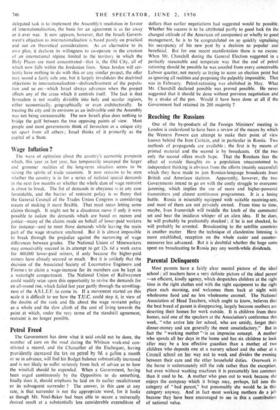Wage Inflation ?
The wave of optimism about the country's economic prospects which, this year as last year, has temporarily swamped the larger and grimmer realities of the long-term situation seems to be raising the spirits of trade unionists. It now remains to be seen whether the country is in for a series of isolated special demands in the next few months or whether the whole dam of wage restraint is about to break. The list of demands in abeyance is in any case formidable, and the barrier of restraint policy is so flimsy that the General Council of the Trades Union Congress is considering means of making it more flexible. That must mean letting some claims through. It might not be a disastrous move if only it were possible to isolate the demands which are based on reason and justice—many of the claims made on behalf of lower-paid workers for instance—and to meet those demands while leaving the main part of the wage structure unaltered. But it is almost impossible to break through the prejudice against the narrowing of wage differences between grades. The National Union of Mineworkers may conceivably succeed in its attempt to get 12s. 6d a week extra for 400,000 lower-paid miners, if only because the higher-paid miners have already secured so much.. But it is unlikely that the decision of the Associated Society of Locomotive Engineers and Firemel to claim a wage-increase for its members can be kept in a watertight compartment. The National Union of Railwaymen could readily seize upon this opportunity to revive the demands for an all-round rise, which failed last year partly through the unwilling- ness of the A.S.L.E.F. to come in. If a movement started on this scale it is difficult to see how the T.U.C. could stop it, in view of the doubts of the rank and file about the wage restraint policy as a whole and the slow climb of the cost of living towards the point at which, under the very terms of the standstill agreement, restraint is no longer possible.


































 Previous page
Previous page